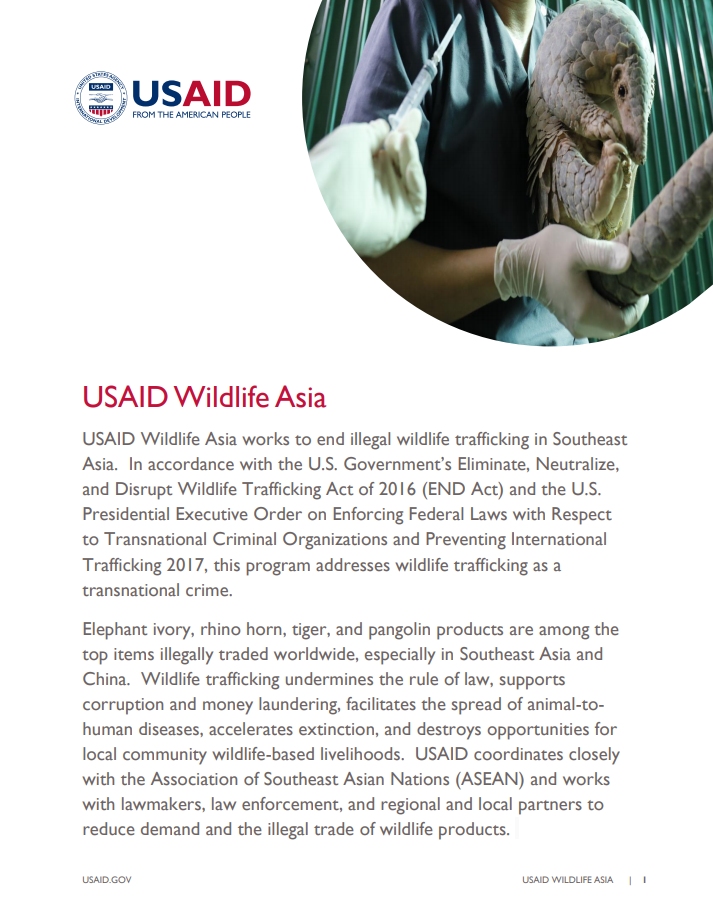Speeches Shim
USAID Wildlife Asia Fact Sheet ![]() (pdf - 262k)
(pdf - 262k)
USAID Wildlife Asia works to end illegal wildlife trafficking in Southeast Asia. In accordance with the U.S. Government’s Eliminate, Neutralize, and Disrupt Wildlife Trafficking Act of 2016 (END Act) and the U.S. Presidential Executive Order on Enforcing Federal Laws with Respect to Transnational Criminal Organizations and Preventing International Trafficking 2017, this program addresses wildlife trafficking as a transnational crime.
Elephant ivory, rhino horn, tiger, and pangolin products are among the top items illegally traded worldwide, especially in Southeast Asia and China. Wildlife trafficking undermines the rule of law, supports corruption and money laundering, facilitates the spread of animal-to-human diseases, accelerates extinction, and destroys opportunities for local community wildlife-based livelihoods. USAID coordinates closely with the Association of Southeast Asian Nations (ASEAN) and works with lawmakers, law enforcement, and regional and local partners to reduce demand and the illegal trade of wildlife products.
REDUCING CONSUMER DEMAND
Surging demand, high prices and lucrative profits from wildlife products are driving the drastic decline in species such as elephants, rhinos, tigers and pangolins. USAID Wildlife Asia helps reduce this demand by communicating, mobilizing, and advocating ways to change practices and build new social norms around the use of wildlife products. For example, USAID Wildlife Asia’s “Beautiful Without Ivory” campaign partnered with Thai fashion influencers to amplify messages discouraging the use of wildlife products.
STRENGTHENING REGIONAL LAW ENFORCEMENT
Working with Interpol, the ASEAN National Police, and the ASEAN Working Group on the Convention on International Trade in Endangered Species and Wildlife Enforcement, USAID Wildlife Asia trains regional police, customs agents, and prosecutors to effectively locate, apprehend, and prosecute illegal wildlife traffickers. The program also brings together enforcement authorities from Asia and Africa to collaborate in dismantling transcontinental trafficking syndicates.
ENHANCING POLITICAL COMMITMENT AND SUPPORT
USAID Wildlife Asia works to secure commitments by governments to end wildlife crime. The program also works with supreme courts, the ASEAN Inter-Parliamentary Assembly, and judicial and legislative champions to improve legal and policy frameworks and share best practices, as well as to make penalties for wildlife crimes more consistent and effective.
SUPPORTING REGIONAL COOPERATION
USAID Wildlife Asia focuses on ending illegal wildlife trafficking in Cambodia, China, the Lao People’s Democratic Republic (Lao PDR), Thailand, and Vietnam. This requires strong regional cooperation with diverse partners, including other U.S. Government agencies and external counter-wildlife trafficking stakeholders.
IMPACTS AND RESULTS
USAID Wildlife Asia has leveraged $11.5 million from private sector partnerships, which are vital for the long-term sustainability and collective action against wildlife trafficking. The program’s policy achievements include the passing of a new landmark national wildlife act in Thailand, which radically increases penalties for wildlife crimes and now serves as a model for the region; supporting the Lao PDR to improve their National Ivory Action Plan, bringing the country closer to international standards; and supporting the next iteration of the ASEAN Regional Plan of Action for Fighting Wildlife Trafficking.


Comment
Make a general inquiry or suggest an improvement.